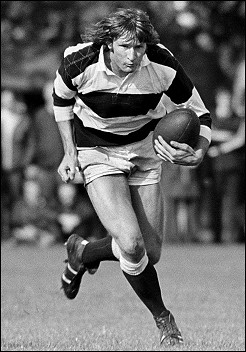By Steven Downes
I first met Andy Ripley more than 25 years ago, when he turned up at Tooting Bec track and raced the 400 metres hurdles for Polytechnic Harriers.
 It was the event that Alan Pascoe used to do for Poly. But here, in a decent standard British League second division match Ripley, by then in his late 30s, took on the “man-killer” event in his typical, swashbuckling style.
It was the event that Alan Pascoe used to do for Poly. But here, in a decent standard British League second division match Ripley, by then in his late 30s, took on the “man-killer” event in his typical, swashbuckling style.
From very close up, it was almost frightening to watch. Apparently with very little specific training (or, it might be said, hurdling style), Ripley charged boldly at each of the 10 barriers, the natural long stride of the 6ft 5in-tall former England rugby forward carrying him over the first six or seven flights, his sheer power, tenacity and grim determination leaving wreckage after the final couple of hurdles.
Ripley won that race. By sheer force of will, he got himself ranked in the country’s top 10 for the event when a decade or more past what ought to have been his athletic peak.
Not that it really mattered. Ripley was one of the last true Corinthian sportsmen, for whom what always seemed to matter far more was taking a risk, having a go, and doing the very best that he could manage. That’s how he played his rugby, electrifying this schoolboy spectactor whenever he tucked the ball under his arm and took off from the back of the scrum.
That’s how Ripley managed to win the television Superstars contest against many, often more naturally talented and mostly younger, athletes. That’s how he made his fortune in the City, or got his MPh at Cambridge aged 50, and then got within an oar’s length of becoming one of the oldest members of a Boat Race crew.
And that’s how – with gusto, character and bravado – for several years, Ripley tackled the prostate cancer that finally claimed his life, at the age of 62, today.
I’d last met Andy when he was among the SJA’s guests of honour at the 2007 British Sports Awards, when he gave a typically Ripley rumbustious speech, urging the audience not only to dip into their pockets for the sake of the prostate cancer charity, but also – somewhat graphically – recommending the generally male and middle-aged attendees to allow their doctors to feel somewhere at little closer to home for the sake of their health.
His speech was by turns amusing, inspiring, exciting and affecting, and thousands of pounds were raised for the cause that day.
Anyone who saw Ripley on that stage, looking tall, tanned and fit, may, like me, have been saddened and shocked when they saw the recent picture of him, in a wheelchair, proudly receiving his OBE from the Prince of Wales. So ill had Ripley become, special dispensation was given by Buckingham Palace for his investiture weeks ahead of the formal announcement of the Queen’s Birthday Honours.
I saw the picture alongside a Paul Kimmage interview in the Sunday Times, where it was made clear that Ripley had little time left. And Ripley made it absolutely clear that he intended, as ever, to make the most of it.
As the Daily Telegraph‘s obituary notes, in the foreword to his book on cancer, Ripley wrote: “Dare we hope? We dare. Can we hope? We can. Should we hope? We must, because to do otherwise is to waste the most precious of gifts, given so freely by God to all of us. So when we do die, it will be with hope and it will be easy and our hearts will not be broken.”
The SJA would like to send its deepest condolences to Andy’s wife, Elizabeth, their three children, his family, and his many, many friends.
Read Mick Cleary’s recent tribute to Ripley
Click here for the Mail’s Peter Jackson’s tribute
SJA MEMBERS: Make sure your profile details are up to date in the 2011 SJA Yearbook by clicking here